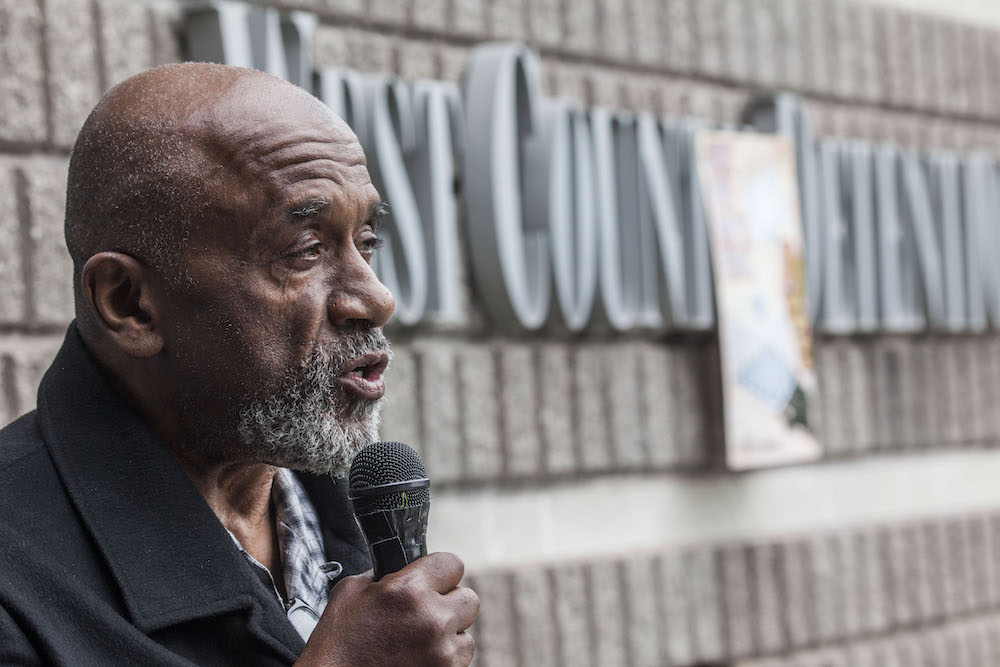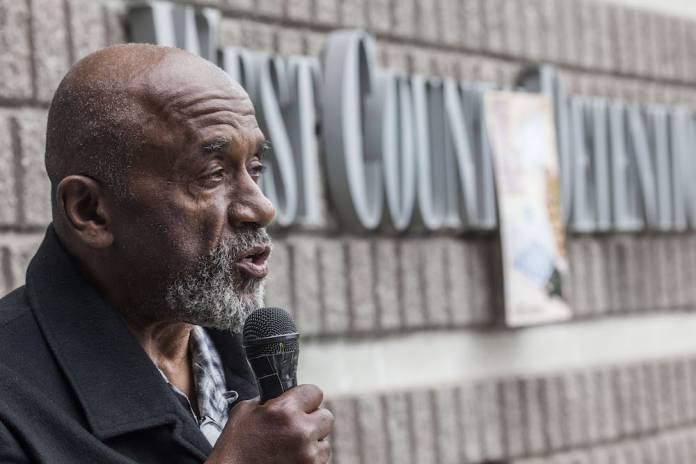We’ve heard the living experiences of people who have had no alternative to leaving home to escape violence, war and poverty, who now find themselves imprisoned in the detention center in front of us. And we have to ask, who is responsible? Where did the violence and poverty come from, that forced people to leave home, to cross our border with Mexico, and then to be picked up and incarcerated here?
Overwhelmingly, it has come from the actions of the government of this country, and the wealthy elites that it has defended.

It came from two centuries of colonialism, from the announcement of the Monroe Doctrine, when this government said that it had the right to do as it wanted in all of the countries of Latin America. It came from the wars that turned Puerto Rico and the Philippines into direct colonies over a century ago.
It came from more wars and interventions fought to keep in power those who would willingly ensure the wealth and profits of U.S. corporations, and the misery and poverty of the vast majority of their own countries.
Smedley Butler, a decorated Marine Corp general, told the truth about what he did a century ago:
“I was a racketeer, a gangster for capitalism,” he said. “I helped make Mexico and especially Tampico safe for American oil interests in 1914. I helped make Haiti and Cuba a decent place for the National City Bank boys to collect revenues in. I helped in the raping of half a dozen Central American republics for the benefit of Wall Street. I helped purify Nicaragua for the International Banking House of Brown Brothers in 1902-1912. I brought light to the Dominican Republic for the American sugar interests in 1916. I helped make Honduras right for the American fruit companies in 1903. In China in 1927 I helped see to it that Standard Oil went on its way unmolested.”
When people in El Salvador and Guatemala and Honduras and Haiti tried to change the injustice of this, the U.S. armed rightwing governments that made war on their own people. Sergio Sosa, a combatiente in Guatamala’s civil war who now heads a workers’ center in Omaha, says simply, “You sent the guns and we buried the dead.”
Two million people left El Salvador in the 1980s and crossed the border to the U.S. How many more hundreds of thousands from Guatemala? How many more after the U.S. overthrew Aristide in Haiti? How many from Honduras after Zelaya was forced from office, and the U.S. said nothing while sending arms to the army that uses them still today against Honduran people?
The poverty that forced 3 million corn farmers from Mexico to come to the US was a product of the North American Free Trade Agreement, making it impossible for them to grow the maize they domesticated and gave to the world. Now Archer Daniels Midland and Continental Grain Company use that inheritance to take over the Mexican corn market to make profits.
Help us save local journalism!
Every tax-deductible donation helps us grow to cover the issues that mean the most to our community. Become a 48 Hills Hero and support the only daily progressive news source in the Bay Area.
When the US sought to impose the Central American Free Trade Agreement on El Salvador, Otto Reich, from the State Department, told Salvadorans that if they elected a government that wouldn’t go along with it, the U.S. would cut off the remittances sent by Salvadorans in the US so that their families at home can live.
Young people, brought from El Salvador as children, joined gangs in Los Angeles so they could survive in the city’s most dangerous neighborhoods. Then they were arrested and deported back to El Salvador, and the gang culture of LA took root there, with the drug trade sending cocaine and heroin back to the US. We are the market, in barrios and working-class neighborhoods here.
When people arrive at the US border, they are treated as criminals. John Kelly, a much more dishonest general who now advises Trump in the White House, calls migration “a criminal-terror convergence.”
Yet people coming to the US are part of the labor force that puts vegetables and fruit on the table, cleans the office buildings, and empties the bedpans and takes care of people here when they get old and sick. Turning people into criminals, and passing laws saying people can’t work legally, makes people vulnerable, and forces them into the lowest wages in our economy.
Knowing where the violence and poverty are coming from, and who is benefitting from this system is one step towards ending it. But we also have to know what we want in its place. What is our alternative to this detention center, and the imprisonment of the people inside? To the hundreds of people who still die on the border every year?
We have had alternative proposals for many years. One set of alternatives was called the Dignity Campaign. The American Friends Service Committeehad another. What we want isn’t hard to see.
We want an end to mass detention and deportations, and the closing of the detention centers.
We want an end to the militarization of the border.
We want an end to the idea that working should be a crime if you have no papers.
But we also want to deal with the root causes.
We want an end to the trade agreements and economic reforms that force people into poverty and make migration involuntary, the only means to survive.
And we want an end to military intervention, to military aid to rightwing governments, and to U.S. support for the repression of the movements fighting for change.
If you think this isn’t possible or just a dream, remember that a decade after Emmett Till was lynched in Mississippi the U.S. Congress passed the Civil Rights Act. That same year, 1965, Congress put the family preference immigration system into law, the only pro-immigrant legislation we’ve had for a hundred years.
That was no gift. A civil rights movement made Congress pass that law. We remember that when that law was passed we had no detention centers like the one in front of us. There were no walls on our border with Mexico, and no one died crossing it, like the hundreds who now perish in the desert every year. There is nothing permanent or unchangeable about these institutions of oppression. We have changed our world before, and our movement here can do that again.
This oped is adapted from remarks David Bacon gave at the People’s Tribunal in front of the West County Detention Center in Richmond earlier this month





